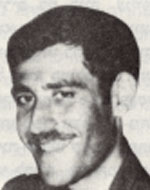Yigal, son of Sarah and Moshe, was born on December 12, 1940 in Tel Aviv, where he studied at the Katznelson Elementary School in Jerusalem and then completed his high school studies at Kibbutz Negba. he lost his father when he was a young boy and was shy and sad but was a good student and was a member of the Hashomer Hatzair movement in Jerusalem at the age of 13. He began to study in Negba, where he was very active in the life of the children and was active in the fields of society, culture and sports. He was a lover of literature in general and of poetry in particular, and had a hand in writing poems, by nature a delicate and sensitive soul, kind and honest. Yigal drafted into the IDF in early August 1958 was placed in the Armored Corps. After basic training and after completing his training course in the “Sherman” tank, he was assigned as a crew member in the Armored Corps. After completing his tank training course at Sherman, a tank commander was appointed. He did well in his post, was sent to an officers’ course, and later took part in a course for armored corps officers and was assigned as commander of a tank division in the Armored Corps. A year later, he was promoted to lieutenant and assigned to the Armored Corps School as a guide in the Armored Corps course. After completing his regular army service he continued to serve for a year in the career army, and returned to the Negev for a short period of time. Until he found his place in the Customs and Excise Department, where he became a researcher and then assistant to the supervisor, but he did not like the office work. After the Six-Day War was often called up for reserve duty and finally decided that he would be in the army and would be re-enlisted in the career army. In the course of time, he studied Jewish studies at the university and excelled in his studies He was a devoted husband and father, and when he volunteered for the career army, he managed to combine his work in the army with family life in a wonderful way, so that his family moved from one place of residence to another, To Herzliya, and recently to Ashkelon, where he made sure he did not miss anything at home, and on his short vacations he used to take his wife and daughters on trips and on every occasion brought them to Sinai, which would be close to him. After a while he was transferred to another battalion in the same position, and after completing an Armored Corps course, a tank commander was appointed. During the Six-Day War, he served as a commanding officer and arrived with his unit in the Suez Canal, where he was promoted to the rank of captain, and was then appointed as a dedicated officer who fulfilled his duties in trust and took on himself problems that were not within his responsibility to advance their solution. At brigade headquarters. His commanders in this position also admired him as an efficient officer, very responsible and disciplined, dedicated to his work, and honest, he took initiative in all areas of his activity. Two years later, he was appointed deputy battalion commander in the Sinai battalion, and was appointed as an outstanding officer, even though he served for a short period of time. His commander in this role recommended his promotion, since he, too, saw him as a very responsible and exceptionally dedicated officer, faithful to his work and commanders, and succeeded in integrating into the work and filling it in a better way. In October 1972, he completed his studies at the Israel Defense Forces Command and Staff School, and in August 1973 he was appointed commander of the Armored Corps School. The day before the Yom Kippur War broke out, Yigal was called from his home and sentTo Sinai. On October 7, 1973, when the force broke out under the command of the city of Qantara in the northern sector of the Suez Canal, Yigal’s tank was hit directly by an antitank missile and he was killed. He was laid to rest in the military cemetery on Mount Herzl. He left behind a wife and three daughters, a mother and a sister. After his fall, he was promoted to lieutenant colonel. In a letter of condolence to the bereaved family, the brigade commander wrote: “Yigal was a serious, responsible and capable officer, and in all positions he was discovered as an officer and a person of stature.” His wife donated a chandelier to his synagogue on Beit El Street in Jerusalem.
